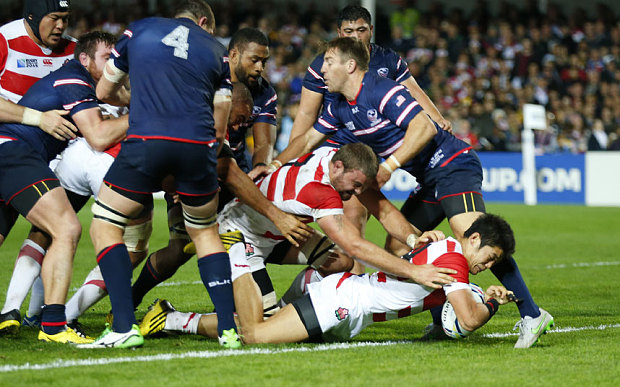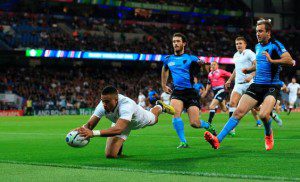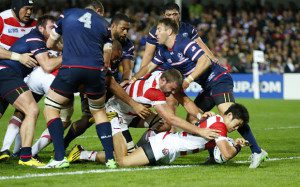
CASTRES, FRANCE – Now we know which teams have reached the quarter-finals of the 2015 Rugby World Cup, and it’s a Rugby Championship v Six Nations face off as New Zealand face France, South Africa take on Wales, Argentina play Ireland and Australia are against Scotland. Here’s how the teams from Pools A and B went on in their final group matches.
POOL A
Wallabies weather Welsh storm
Australia 15 – 6 Wales
It was, arguably, the best tryless rugby match anyone will ever see – a defensive battle so epic and unyielding that the word titanic does not come close to describing it.
The scoreline is easy. Five Bernard Foley penalties to two for Dan Biggar, but the score is not the story. The score, in terms of this match, is the least of it. Apart from the fact, of course, that it means Australia now take on Scotland in the quarter-finals, with the Welsh face a much more difficult task against a powerful South Africa.
The first half was a cagey, slow-burn as two unyielding defences battered anything that moved. Australia’s forwards – for so long a joke – were on top, but there wasn’t much in it. It was enthralling and gripping stuff, if not wildly entertaining.
But, 13 minutes in the second half, when Australia had first Will Genia and then Dean Mumm in the sin-bin, were worth the high price of Twickenham tickets alone.
With Genia, Mumm, coach Michael Cheika and thousands of Australians unable to do anything but watch and hope and cheer and pray Wales, with the crowd at Twickenham doing a better-than-fair impression of the Millennium Stadium in full cry, threw everything at the 13 Wallabies still on the pitch. They called for scrum after scrum. Mauls rolled and drove with murderous intent. They picked up the ball from rucks and attacked at savage angles. They ripped into the midfield and slipped the ball out wide.
Australia stood firm. The line held. Hell, even Bernard Foley stopped George North in his tracks with a perfect tackle.
But the moments – two of them – that decided the match were still to come. First, North – playing at centre – looked certain to score but, as he reached the line, Wallaby flanker Ben McCalman got underneath to stop him touching down. Then Taulupe Faletau lost control of the ball in the act of touching down.
And when Adam Ashley-Cooper wrapped up Dan Biggar in a tackle that forced the outside-half to concede a penalty for holding on, the game was as good as over.
England’s damp squib farewell
England 60 – 3 Uruguay
It was supposed to be a celebration. It was supposed to be England’s valedictory farewell to the pool stages of their Rugby World Cup having already seen off the sterner challenges of Australia and Wales to book their place in the last eight. It was supposed to be a Manchester-based ‘thank you’ to all those England fans in the northern wastelands who had patriotically done the whole #weartherose thing without being able to make the pilgrimage Twickenham.
As it turned out, the mood at the City of Manchester Stadium before kick-off was far from celebratory. That was because the valedictory part of the intended valedictory farewell had been well and truly broken over the past two weekends back at Headquarters. First Wales gave it a good shoeing, before Australia ripped it clean off the rickety England bandwagon, chewed it up and spat it out over the Twickenham turf.
Still, one out of three isn’t bad. Well, actually, it’s only 33%. But it could be worse. Not much worse, admittedly. But a bit worse. Enough. Just enough, if you’re English.
Fans, players, coaches, backroom staff, and pundits alike were all sporting the Brave Face Grimace ahead of Saturday’s Uruguay game. If someone could recreate it as a mask, an upward-turning mouth-gurn that almost but not quite hides the not-quite-faded sadness behind the eyes, they’d make a fortune from disconsolate sports fans not quite ready to let their face do the job on its own.

It was never a question of whether England would beat Uruguay. It was only ever going to be by how much. As it turned out, it would have been more than enough to see them through to the last eight, if they had drawn the game against Wales.
It’s a moot point, but let’s play What If?. Let’s assume for a moment that England had got over their collective brain freeze against Wales. Let’s also assume Owen Farrell had done his sneaky-dog-eyes thing, then slotted the ball through the uprights to salvage the draw. Could anyone seriously then see England beating South Africa, a side they have not prevailed against under Stuart Lancaster, in the quarter-finals? Even at home? And then, could you really seem them repeating the trick against – as likely as not – New Zealand?
Anyone? Honestly?
England did try to turn their Manchester day-trip into a party – and 10 tries suggests there was something to celebrate. But they were disjointed and – despite three playmakers across midfield, with a spare one filling in at fullback for good measure – lacked penetration for long periods. They made lots of pretty passes, but went nowhere. And, when they did look like they were going somewhere, someone would drop the ball, or make a wrong decision.
So, after Anthony Watson benefited from a rare display of accurate attacking rugby from the backs to open the try-scoring, England had little choice but to rely on their forwards. You have to regard forcing the men in white to revert to grunting, heaving type as a victory for the Uruguayan defence – as you do the halftime score of 21-3, which sits proudly alongside the 28-9 halftime score against Wales and the 31-3 first-40 figure against Australia.
After Watson, England needed the old head of Nick Easter to score their second and third tries. He would add a third around the hour-mark, by which time the hosts were away and clear.
Watson scored his second while Uruguay were temporarily down to 14 men early in the second half. The impressive Henry Slade followed suit – begging the question why he had to wait for this dead rubber to make his World Cup debut. In fact, it wasn’t until the final quarter of England’s final game that Slade joined forces with replacement Jonathan Joseph in midfield. That’s the England centre partnership that a certain Brian O’Driscoll believes could be just a little special. You’d think he may know a thing or two about it.
By now, the Uruguayans – amateurs playing professionals for the second time in just four days – were fading fast and Jack Nowell got in on the act, scoring the first of his hat-trick of tries shortly before the hour. He scored his second and third within 17 minutes, before England rounded off their post-horse-bolting whitewash busting with a penalty try after the hooter.
POOL B
Scots edge thriller to reach last eight
Samoa 33 – 36 Scotland
Greig Laidlaw’s one-man show was – just about – enough to ensure an otherwise poor Scotland booked their place in the quarter-finals, and finish-off Japan’s hopes a day before the Brave Blossoms faced USA.
The scrum-half scored 26 of his side’s 36 points as they survived a scare-and-a-half from Samoa, for whom pride is a powerful emotion worth playing for. And, for some time before Laidlaw’s Boot of Eternal Justice settled proceedings, it looked like the Samoans had the beating of Vern Cotter’s side.
The Pacific islanders ran in three of a pulsating match’s five first-half tries to head back into the changing rooms at the interval with a three-point lead.
All week, Scotland had spoken of their need to get out of the blocks faster than they have done so far in the tournament. They didn’t. They were awful early on – slow at restarts, passive in the tackle, vulnerable out wide and there for the taking all over the pitch.
It does not bode well for their quarter-final against Australia.
Samoa were thunderous and powerful and accurate and Tusi Pisi, Ma’atulimanu Leiataua and Rey Lee-Lo all crossed in the first 40. Samoa were bossing the match, and bullying Scotland off the ball.

But somehow, Scotland stayed in touch – aided and abetted by lapses in Samoan concentration. A kamikaze decision to play rugby near their own try line allowed Tommy Seymour to steal the ball for the softest of scores. John Hardie barged over for a try after the Samoans’ third score while Scotland were temporarily reduced to 14 men. Those scores, plus Laidlaw’s unerring accuracy kept the Scots in the game.
They were better in the second half. They could hardly be worse. Their scrum, belatedly, fronted up. And Samoa could not resist the urge to break the rules. Time and again they were penalised, yet somehow referee Jaco Peyper resisted the urge to reach for a card.
Maybe it was punishment enough that Laidlaw was slotting just about everything. And, when he scored from the back of a solid Scottish scrum, it looked over. But there was one more fright to come as Motu Matu’u bullocked over two minutes from time.
Japan sign off in style against USA
USA 18 – 28 Japan
For a while, a certain unwanted Rugby World Cup record looked like it could head the way of one of three Pool A teams – but, in the end, Japan become the first side to win three of their four pool games and still fail to qualify for the knockout phase of the competition.
In the end, bonus points – or, more accurately, the lack of them – cost Eddie Jones’s Brave Blossoms. And the World Cup is the poorer for their departure. No more in this tournament will we see Fumiaki Tanaka boiling around the rucks, Craig Wing terrifying defences with his uncanny ability to bounce off tacklers or Michael Leitch scavenging at another breakdown. Most of all, we’ve seen the last of Ayumu Goromaru nailing just about every kick at goal, scoring poetically beautiful tries or making flying last-ditch try-saving tackles for the ages.
The fullback added another record in his last match of England 2015. His two penalties either side of the break took him past 700 international points, making him became the first player from a Tier Two nation to that mark.
Not for the first time, Japan proved that the size of your opponent doesn’t always matter if you play with verve and skill and determination and passion. They may have been outmuscled and outweighed by a monster Eagles’ XV, but they were very definitely not outwitted.
They scored the first try of the evening, when Kotaro Matsushima coasted clear to the line after fine work from Ryu Koliniasi and captain Leitch.

But USA were enjoying a healthy share of possession and territory. They regained the lead after 24 minutes when Chris Wyles’ pass gave Takudzwa Ngwenya the room to score in the corner.
Japan’s second owed more to luck and grunt than good judgement. Lock Luke Thompson did well not to drop the ball in surprise when it was passed to him while he had his back to play. But the forwards gathered round him and shoved him to the line, for winger Yoshikazu Fujita to score.
In the second half, the flying Ngwenya thought he was away for his second – only to be scragged by replacement Amanaki Mafi. The number eight would then score Japan’s third from an attacking line-out.
USA, at least, had the final word with Wyles finishing off a powerful attack.
Feel free to comment below, look for and “Like” our Facebook Rugby Wrap Up Page and follow us on Twitter@: RugbyWrapUp, James Harrington, Junoir Blaber, Jamie Wall, Nick Hall, DJ Eberle, Jake Frechette, Scheenagh Harrington, Jamie Loyd, Cody Kuxmann, Karen Ritter, Audrey Young, Akweley Okine and Declan Yeats, respectively.

